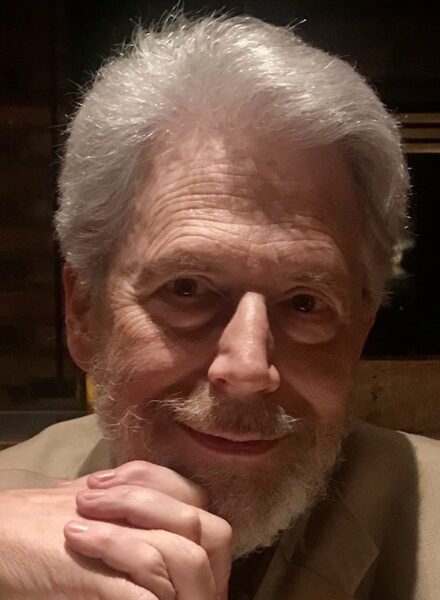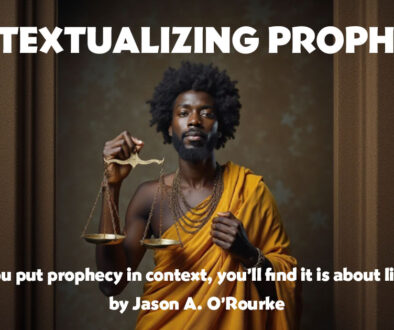What Jesus Died For
by Loren Seibold | 17 May 2022 |
We often say that our sins killed Jesus on the cross. Lately I’ve begun to wonder if that’s accurate. That perhaps it was not just our sins, but sin. Not just the bad deeds we do, but all the ways sin hurts us.
“All of creation groans with pain, like the pain of childbirth.”
Romans 8:22 (Good News Translation)
“Was everything OK?” he asked. Yes, we said. As good as usual. Curious why our Cracker Barrel waiter was a middle-aged man, soft-voiced and serious, when usually they’re young people, students, occasionally older women, I asked, “How long have you worked here?” “Eight years,” he said. “I worked at the Newtech plant,” he said (as though we would know it, though we were only traveling through a town far from home), “but I got laid off, so I started working here.” “So you like it?” I asked. “Well, last year my wife got very, very sick, and they tried to accommodate me so I could take care of her.” He gathered up the dishes, then turned back. “She just died. Just a few weeks ago.” His voice broke.
What to say? After all these years comforting people, I still feel helpless at the rawness of new grief. We expressed our sympathy, as much as we could in a few moments with a stranger. Although others were waiting, he stayed by our table for a minute longer. He told us how empty the house was now. He had a 16-year-old daughter, and her mother’s death had devastated her, though he hoped the busyness of high school would keep her occupied. “If you believe in prayer,” he added as he turned to go, “say some for me. That’s all I have to depend on.”
Back in the car, we sat in silence for a long time. “I think there are many people like that,” Carmen finally said, and I agreed. Barely making it through each day, finding and losing jobs, struggling with sorrows they haven’t the resources to handle.
In Paul Zindel’s award-winning play The Effect of Gamma Rays on Man-in-the-Moon Marigolds, a mother tells her studious daughter,
I spent today taking stock of my life and I’ve come up with zero. I added up all the separate departments and the result is zero… zero zero zero zero zero zero zero zero
zero zero zero zero zero
zero zero zero
zero zero
zero
And do you know how you pronounce that? You pronounce it oooooooooOOOOOOO. Like a moan.
Sometimes life is so enjoyable, so promising. But at other times it’s fears and tears and passing years. We take stock of life and it turns out to be a struggle, a trial, a cry of pain, a wailing moan for existence.
As a pastor I liked to do personal home visits with church members. Most people try to present their best face to the pastor. Yet I’ve also seen how close to the surface are many of the hurts. I don’t pry—I don’t have to. (I also don’t tell.) When we sit down to talk, Jesus being there as he promised, I’m astonished at how people who look like they have ideal lives have a sorrow, a fear, a painful memory, just below the surface. A child who’s lost his or her way. A divorce. An affair. A youthful indiscretion. A threatening cancer. A brutal childhood. A sibling who died in a car accident. Sometimes 40 or 50 years have passed, but it’s still there, close, like a stillborn baby still cradled in the heart, never buried.
Always, in some small way, it poisons. We often say that our sins killed Jesus on the cross. Lately I’ve begun to wonder if that’s accurate. That perhaps it was not just our sins, but sin. Not just the bad deeds we do, but all the ways sin hurts us.
We hear every week of thousands of lives lost in the most horrible ways: starvation, war, disease, tsunami, genocide. We click our tongues, then pass them off as statistics, because we must: we couldn’t take onto ourselves all the pain of even one death, much less a million of them. And perhaps what Jesus took upon himself at the cross, the weight that killed him, wasn’t just our misdeeds, but all the pain suffered by all the well-meaning people in the world. That he was wounded not just by our transgressions, but by our house fires, our positive biopsies, our disappointing marriages, our lost children, our migraines, our sleepless nights, our foreclosure notices, our mental illnesses.
This is, it seems to me, a more comprehensive way to understand sin, and a more gracious way. Yes, people do horrible things. But people can be forgiven—that, at least, the Bible is clear about. An earthquake, a plague, a cancer, cannot. Were the Christian perfectionists to be suddenly fantastically successful, and everyone on earth managed to be very, very good, low-pressure cells would still form over warm oceans, spin into typhoons, hit land and kill thousands. Microorganisms against which we’ve no immunity would still sweep through populations. Tectonic plates along the Pacific Rim would still shift.
Because not just people, but all of creation groans waiting for salvation. Christ died for that, too. Perhaps mostly for that. We are all of a piece, we and the universe we live in.
Here some people, people who need someone to blame, begin to get a bit annoyed. You’re letting us off the hook, aren’t you? they say. You’re talking about no responsibility, no accountability. You’re saying we’re all just victims.
Well, yes, in a way we are. I didn’t eat from the Tree of Knowledge of Good and Evil. Yet I’ve suffered plenty of pain and unhappiness. Yes, I’ve made choices to do things I knew were wrong, and so have you. But according to the Judeo-Christian story, I never would have experienced any of that had it not been for a choice that someone else made a long time ago. Paul admitted that “in Adam all die,” and while that doesn’t take me off the hook for my own choices, it does explain why both my parents got cancer and died young in spite of living healthy lives, why my friend’s child was born with permanent disabilities though he and his wife had prayed for a healthy family, and why another friend has clinical depression even after accepting Jesus as his Savior.
So often I hear Christians scolding about other people’s sins. We scold about drugs and homosexuals and abortion and pornography. Have you noticed that the people who criticize others for their choices and demand they be accountable seem to assume that they themselves are making the best choices they could? No Christian would deny that “all have sinned and fallen short of the glory of God.” It’s just hard for us to identify our own greed, gluttony, anger, and pride when there are things like homosexuality, abortion, drugs, and pornography happening out there.
Every time there’s a major election coming up I hear a lot from politically minded Christians about what other people shouldn’t do. Quit being homosexual, quit being so lazy and taking my taxes, quit having abortions, quit using drugs, quit sneaking across our borders, quit trying to vote differently than I do.
It is astonishing to how many Christians that’s the gospel. The gospel of cut it out. The gospel of get out of here. The gospel of straighten up.
That is a pathetic gospel, a syphilitic gospel, an utterly useless gospel. Even on those occasions when it’s good advice, it’s never good news. You don’t need a loving God for a gospel like that. You just need opinions. For the gospel is not, and never has been, about the improvements we need to make, though we undoubtedly require many. It is about what God has already done. It is his power, not ours (for ours, we have demonstrated repeatedly, is inadequate) that is good news.
The human psyche is far too complex for us to know why people make the choices they do, but I’ve chosen to rely upon the operating theory that most people are doing about the best they can. Almost without exception. Even some supremely dysfunctional people might be (as far as we know) maxing out their potential. Consider the boy born with crack cocaine already in his veins. The girl who learns all she knows about sexual morality from an abusive stepfather. The child raised with no convenient example of anyone in his world holding a job. Millions born with a losing combination of genes, raised in a setting that doesn’t help them one little bit to overcome whatever combination of bad tendencies they were launched into the world with.
That’s the kind of universe we live in. One where sin is not just chosen, but is thrust upon us. That’s what sin is, and that’s what sin does. We are sinners, but we’re also sinned against. Sinned against by existence itself. Jesus died for that, too. And so our first task, even before helping others identify their sins (a task at which we Christians are known to be experts) is to help them fight back against an existence that by its very nature has it in for us, by marshaling to our side all the love and power that God has for us.
We Christians make the propensity to sin our headline, until it leaves everyone feeling hopeless. Let’s admit that we don’t just do sin. Sin does things to us. It has created the setting in which all of those things we hate happen. So while not subtracting a bit from the bad choices you and I make, we can (if we are thoughtful) begin to see God’s mercy penetrating and trying to heal every continent and ocean and nebula, every atom, every cell, every quantum process of this diseased universe—not just the actions human beings do that are easiest to identify and blame them for.
Jesus died for our guilt, but also for our grief. Jesus died for our carelessness, but also for our cancer. Jesus died to atone for our envy, but also for the earthquakes that shake the very ground we stand on.
In the end he’s going to heal it all, the personal and the universal. If the parable in Matthew 25:31–46 is to be taken seriously, all he asks in the meantime is that rather than exclude and blame, we pitch in and help the victims of sin, just as he did while on this earth.
 Loren Seibold is the Executive Editor of Adventist Today.
Loren Seibold is the Executive Editor of Adventist Today.




